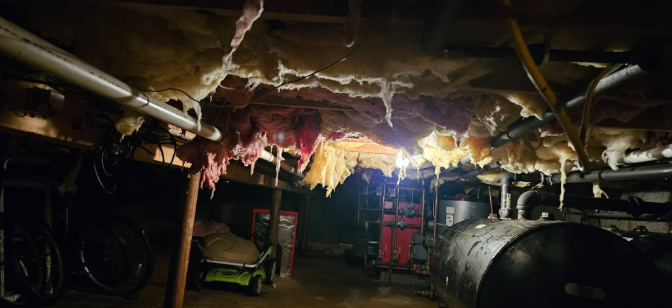The best basement insulations are sprays, including foam insulation as a long-term solution, with moisture resistance that also provides energy efficiency. It’s going to offer you benefits that other means of insulation are not going to offer. All the information you need to know about spray foam insulation for basements is included in this article.
Advantages of Spray Foam Insulation for Basements
Basements are notoriously wet, chilly, and energy-loss-prone. Insulation done right can help solve these problems. Some of the major advantages of insulating your basement using spray foam are the following:
1. Energy Efficiency
By sealing all air leaks, commercial spray foam insulation lowers energy loss. This reduces the cost of heating and cooling your home by maintaining a consistent temperature.
2. Moisture Control
Mold and mildew love under-maintained basements. A moisture barrier spray foam seals your home against unwanted moisture.
3. Improved Indoor Air
It fills the gaps and crevices and improves the quality of air indoors by preventing allergens and pollutants from entering the structure and removing drafts.
4. Strength
Spray foam, unlike other conventional insulating materials, will last long term.
Is Spray Foam Insulation Good for Basements?
Absolutely. Spray foam is one of the best options for sealing a basement. It is better than conventional, traditional materials such as cellulose or fiberglass. Why?
- Air Sealing: Spray foam insulation sticks well to surfaces, seals cracks, and gaps; the cold air does not penetrate it.
- Water-Resistant: The closed-cell version does a pretty good job of resisting water from penetrating. That can often be an important key for a damp basement.
- Mold Control: Spray foam does reduce the amount of moisture; hence, it is quite unlikely that mold or even mildew will appear inside the living area.
It is recommended to hire professional spray foam insulation installers so that the materials apply right and to their utmost potential.
The R-value of Spray Foam Insulation in A Basement
The R-value measures a fabric’s resistance to heat transfer. works in the basement.
Closed-Cell Spray Foam: With an impressive R-value of about 6.5 per inch, closed-cell spray foam provides superior insulation in minimal space. It’s an excellent choice for areas requiring strong resistance to heat loss.
Basements often benefit from closed-cell foam insulation due to its efficiency and enhanced moisture resistance, helping to create a well-insulated and durable space.
How Much Foam Insulation Thickness is Needed for a Basement?
How thick your foam insulation will depend on a host of factors; these include climatic considerations and energy efficiency targets, plus the type of foam.
Closed-Cell Spray Foam: A thickness of 2-3 inches is usually enough to provide excellent insulation and moisture resistance for most basements.
Consulting with professional home insulation contractors can help determine the ideal thickness for your specific needs. They can evaluate your basement and recommend the best approach to achieve optimal energy efficiency.
How To Insulate a Basement Using Spray Foam
- Preparation: Clean the area, dispose of vintage insulation, and dispose of any moisture troubles before applying spray foam.
- Fill in the Gaps: Spray foam fills inside the crevices and areas to ensure a whole seal.
- Wall Insulation: The foam is spread over the walls with special care where air leaks most often.
- Curing: This foam needs a full cure time that takes nearly 24 hours.
- Finishing: Once the foam is cured, it can be covered with drywall or any other finish for a finer appearance.
Commercial insulation contractors in my area save time and hassle by completing the job efficiently and promptly.
Read also: Don’t Make These Basement Insulation Mistakes
Why Hire Professional Spray Foam Insulation Installers?
DIY spray foam insulation may appear to be a less pricey choice, here’s why it makes sense to hire experts:
- Expertise: Skilled installers possess the knowledge and expertise necessary to apply spray foam accurately and effectively.
- Equipment: To guarantee uniform distribution and ideal thickness, they employ specialized instruments.
- Safety: The experts use the right safety procedures, which lower the hazards associated with applying spray foam.
- Warranty: To provide you with peace of mind, a lot of house insulation contractors include a guarantee for the job.
Cost of Basement Spray Foam Insulation
The main factors determining the installation cost of spray foam include the size of your basement, the type of foam, and labor costs. For example, when compared to other materials for insulation, spray foam may be expensive at first. However, the energy that is saved using the foam makes up for the expenses. Its durability also makes it economical.
Conclusion
It’s quite a game-changer when it comes to basement insulation—unmatched energy efficiency, moisture resistance, and durability. You can have an amazing, energy-efficient, and cozy space in your house by choosing the right kind of spray foam.
give us a call now to convert your basement into an energy-saving, insulated room!






